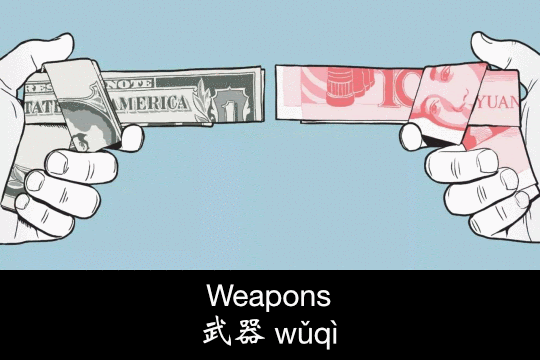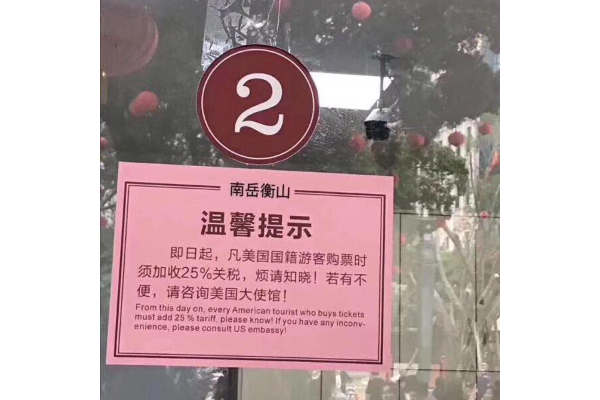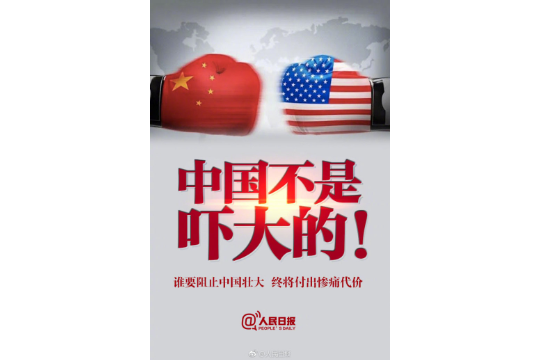China’s weapons in the duel against Trump



 How China can fight
How China can fight
Just after we sent our newsletter yesterday looking at Chinese state media commentary on the proposed American tariffs on $50 billion worth of Chinese goods, Donald Trump called China’s retaliatory plans to tax 106 American goods “unfair” and instructed the United States Trade Representative (USTR) “to consider whether $100 billion of additional tariffs would be appropriate.” China’s curt response, per Xinhua News Agency:
China is fully prepared and will not hesitate to strike back fiercely if the United States unveils the list of additional tariffs on 100 billion U.S. dollars of Chinese products, the Ministry of Commerce (MOC) said.
“We are not taking any options off the table,” Gao Feng, spokesperson with the MOC, said at a press briefing Friday.
Reuters reports that Gao elaborated: “If the United States announces an additional $100 billion list of tariffs, China has already fully prepared, and will not hesitate to immediately make, a fierce counter strike.”
What weapons does Beijing have in its armory? Additional duties on U.S. goods imported to China is the obvious option, but as Bloomberg’s Gadfly points out, reciprocal tariffs, “when added to the $53 billion in trade that’s already under threat, would max out China’s ability to retaliate through conventional means,” because $153 billion is already more than China buys from the U.S. in most years. Which is why China might fight back without additional taxes, but instead do one or more of the following:
-
Interfere with American companies in China: During the height of tensions between Beijing and Seoul last year over the THAAD missile deployment, South Korean companies like Lotte and Hyundai found themselves the subject of official investigations, project suspensions, and consumer boycotts. South Korean TV shows were taken off the air, while previously scheduled opera and K-pop performances by Korean entertainers were canceled without explanation.
-
Make bureaucratic obstacles for American imports and companies: In 2012, when relations between the Philippines and China were highly strained by their ongoing South China Sea dispute, China said that bananas imported from the island nation were “infested by pests” and began “requiring full inspections on all shipments.” The slowdown spread to Filipino papayas, mangoes, coconuts, and pineapples.
A similar tactic was used to punish Norway after activist Liu Xiaobo 刘晓波 was awarded a Nobel Prize in 2010: “Norway’s salmon rot as China takes revenge for dissident’s Nobel Prize” is how the Independent put it. -
Target Trump’s business interests: What the Party giveth — for example, the new China trademarks given to Trump last year — it could take away. Ivanka Trump licenses her brand for production and distribution in China, and her father’s buildings have many Chinese tenants, including the Industrial & Commercial Bank of China.
-
Gang up on the U.S. with Russia and North Korea: The beating of trade war drums comes just after Kim Jong-un’s visit to Beijing, and in the same week that China’s defense chief said his trip to Russia was “a signal to the U.S.”
-
Restrict study abroad and tourism: There are more than 300,000 Chinese students at American high schools and universities, and around 3 million Chinese visitors each year. There are many ways to slow that flow.
-
Target Trump supporters and red states: The New York Times says (paywall) “Chinese officials seem to believe they can take advantage of what they consider vulnerabilities in the American political system,” quoting a Peking University professor who explains that China has targeted farm products such as soybeans with its retaliatory tariffs because the “American agricultural sector is quite influential in the Congress.” Party scholars in Beijing are probably already compiling lists of other pressure points and special interest groups that will give China leverage over Trump.
-
Encourage anti-American sentiment in China and abroad
The image below is circulating online and apparently shows a sign at a nature reserve at Hengshan asking for 25 percent extra on admissions for American tourists in response to the Trump tariffs. This recalls popular sentiment against Japan at times of tension that has spurred citizens to “ban Japanese and dogs” from their restaurants.

These actions are not official by any means, but the Party is adept at manipulating popular anger. And nothing will make the Chinese people angrier than a spike in living costs, which may be the result of a trade war with the U.S.
Social media: China’s not scared!
On social media, Chinese people are already angry. Internet users have reacted to the tariff dispute with anger and displays of patriotism. On Weibo, there is a hashtag campaign called “China’s not scared!” (中国不是吓大的 zhōngguó bùshì xiàdà de), apparently initiated by the People’s Daily (see image below) which has already attracted over 48 million views and 45,000 comments.
 In reaction to a tariff-related post (in Chinese) published by the official account of the People’s Daily, the most upvoted comment reads, “As Chairman Mao said long ago, American imperialism is a paper tiger.”
In reaction to a tariff-related post (in Chinese) published by the official account of the People’s Daily, the most upvoted comment reads, “As Chairman Mao said long ago, American imperialism is a paper tiger.”
Access members: Watch our conferences streamed online free
We are pleased to announce that we are opening up all premium video streams of our conferences to The China Project Access members.
-
Watch our NEXT CHINA conference video recording via this private YouTube link.
-
When the live stream for our next event, the second The China Project Women’s Conference, is set up, we will send you a promo code that you can use to access the video feed for free.
A few other things for members:
-
Discounted tickets to our second The China Project Women’s Conference, on May 14 in New York. Click here to learn about the conference, and enter promo code ACCESS25 to get 25 percent off your ticket!
-
A direct link to our Slack channel, for your bookmarks. Also, check out our archive of expert guest chats.
-
An early-access RSS feed for the Sinica Podcast: http://sinicaaccess.libsyn.com/rss. Ask us on Slack if you need help setting it up on your podcast reader.
-
Our The China Project Red Paper, free for members.
We really appreciate your support as Access members. Please chat with us on our Slack channel or contact me anytime at jeremy@thechinaproject.com. You can reach our whole editorial team at editors@thechinaproject.com. We love feedback!
—Jeremy Goldkorn, Editor-in-Chief
-
The Chinese Institute for Brain Research
Beijing launches pioneering brain-science centre / Nature -
Communist sperm
Why Chinese sperm donors now have to answer the Communist Party’s call / SCMP -
Hong Kong
Attacks against academic Benny Tai may be paving way for controversial national security law, scholars warn / Hong Kong Free Press -
Religious freedom
China bans online Bible sales as it tightens religious controls / NYT (paywall)
“The measures to limit Bible sales were announced over the weekend and began taking effect this week. By Thursday, internet searches for the Bible came up empty on leading online Chinese retailers, such as JD.com, Taobao, and Amazon, although some retailers offered analyses of the Bible or illustrated storybooks.” -
Gender equality
Is gender equality at Chinese colleges a sham? / Sixth Tone -
Putting a damper on China’s rain-making idea
Could Tibetan clouds save China from drought? / Economist (paywall)
The Economist points out, in response to the widely shared SCMP article about a cloud-seeding project over the Tibetan Plateau, that “the largest study of iodine cloud-seeding so far, the Wyoming Weather Modification Pilot Programme, found in 2016 that, although the technique can increase precipitation if wind and other conditions are just right, it cannot do so reliably over a long period or on a large scale.” -
Celebrity gossip
Six years after Chinese pop star Zhang Muyi (24) declared love for 12-year-old Miki Akama, they’re now tying the knot / What’s on Weibo
 BUSINESS AND TECHNOLOGY:
BUSINESS AND TECHNOLOGY:
-
Are China’s drug price controls failing?
Online sales of nonprescription medications have boomed in China in recent years, providing patients with relief from high prices at hospitals. But pharmaceutical companies — and hospitals, which are fighting back against a government-mandated elimination of medicine surcharges — have put intense pressure on online retailers to raise prices. -
China’s biggest food delivery app buys China’s biggest on-demand bike service
Meituan-Dianping is a tech company that does food delivery, restaurant reviews, group buying, and many other services, and it seems to have China’s dominant car-hailing company, Didi Chuxing, in its sights. The latest new service comes with the acquisition of Mobike, as Meituan joins Didi in the crowded bike-sharing space. -
A new type of Chinese free-trade port for Hainan?
General Secretary Xi Jinping is expected to speak at the Boao Forum for Asia, to be held on the southern Chinese island of Hainan from April 8 to 11. Sources have told the South China Morning Post that Xi is likely to propose a new free-trade port on Hainan in his keynote speech at the forum.
POLITICS AND CURRENT AFFAIRS:
-
China announces retaliation for Trump tariffs
China announced a proportional response to the Trump administration’s list of $50 billion in tariffs, a day after it was released. After a 60-day comment period, both tariff packages — China’s on 106 American products, and America’s on over 1,300 Chinese products — are set to go into force at the same time. -
People’s Daily online exhorts China to ‘stab at the heart of the snake’ in response to U.S. tariffs
On this year’s Qingming Festival, or Tomb-Sweeping Day, Chinese state media mythologized China’s past and made a striking call to arms to respond to Trump’s tariffs. “Bravely unsheathe the sword, have the courage to oppose, stab at the heart of the snake” is how an editorial in the People’s Daily online was headlined. -
China fires back in trade war with Trump, but global face-off in tech is just getting started
China applied $3 billion in tariffs on products, largely agricultural products produced in states that voted for Donald Trump, in retaliation for steel and aluminum tariffs that went into effect a week and a half ago. Meanwhile, it is clearer than ever that American officials are dead set on directly countering China’s “Made in China 2025” industrial policy, regardless of any short-term agreement on trade. -
Journalists worry about the South China Morning Post
A New York Times article on the South China Morning Post — Hong Kong’s English-language paper of record — has inspired a debate amongst China journalists. While almost everyone who covers China reads the SCMP’s reporting, many critics say that the company is being used as a slick propaganda tool for Beijing. -
Whitney Duan: Prelude to a takedown of former premier Wen Jiabao?
Caixin reported, and then deleted, the story of Whitney Duan 段伟红, a business associate of former premier Wen Jiabao 温家宝, being detained last year. “Duan is clearly in trouble. How her fall will play out — and if she’ll take Wen Jiabao’s family down with her — could become one of the most interesting stories of 2018. On the other hand, Duan could simply disappear into a memory hole, and we may never know what has been going on,” Jeremy wrote.
SOCIETY AND CULTURE:
-
Hong Kong university to punish students protesting Mandarin test
A little over two months after a group of students from Hong Kong Baptist University (HKBU) stormed the school’s language center to demonstrate strong objection to a compulsory Mandarin-language proficiency test, the university announced today that the two leading students in the protest would receive punishments. -
Kuaishou takes down hundreds of videos featuring teen moms
Kuaishou, one of the biggest short video platforms in China, apologized today after state media criticized it for failing to censor content featuring teenage mothers showing off their pregnant bellies and babies. In April, China Central Television (CCTV) said several video services, including Kuaishou and Huoshan, encouraged teenage girls to show off their adolescent pregnancies and compete with one another to be crowned as the “youngest mother on the internet.” -
Chinese student who bought semi-automatic rifles to be deported from U.S.
As America struggles to make sense of yet another mass shooting — on Tuesday, at YouTube’s headquarters in San Bruno, California, where three people were reportedly injured — a student from the PRC and a student from Taiwan are both in trouble in the U.S. for gun possession. -
Graduate student’s suicide raises questions about the professor-student power dynamic on Chinese campuses
The suicide of a graduate student at the Wuhan University of Technology’s School of Automation two weeks ago has sparked a discussion online about the relationship between mentors and mentees at Chinese universities.
VIDEO OF THE DAY
 Chefs showing off their incredible cooking skills!
Chefs showing off their incredible cooking skills!
Check out these stunning cooking skills from chefs in China!
Gale-force wind rips off a rooftop
Watch the terrifying moment when a strong gust of wind ripped the roof off a market in Dezhou, Shandong Province.
ON SUPCHINA
 China Sports Column: Zlatan’s $100 million China offer and Man U’s Chinese ‘fans’…? Don’t believe everything you read
China Sports Column: Zlatan’s $100 million China offer and Man U’s Chinese ‘fans’…? Don’t believe everything you read
This week, it was reported that LA Galaxy signee Zlatan Ibrahimovic had turned down nearly $100 million from a Chinese club to ply his trade in Los Angeles for the meager sum of $1.5 million per year. But if it sounds too good to be true, that’s because it is. From the size of Manchester United’s Chinese fan base to the actual reach of the AFL, when it comes to sports reporting in China, it pays to be skeptical.
Anheuser-Busch InBev and the fight for China craft brewing
AB InBev’s purchase of Shanghai’s Boxing Cat Brewery last March was only one step in the conglomerate’s plan to dominate the China beer market. But it faces resistance led by one very serious local contender: Carl Setzer of Beijing’s Great Leap Brewing. “What’s best for Chinese craft beer development is for local, independent Chinese craft breweries to work together for the next five to 10 years,” Setzer said, “whether we like each other or not, and agree that ABI is not good for our industry.”
Sinica Podcast: Why China and North Korea are not as close as you think: Ma Zhao and John Delury talk history
Two scholars of China and North Korea discuss how both China and the U.S. selectively remember the history of the Korean Peninsula, and how the real past of China-North Korea relations comes to bear on the present.
-
Subscribe to the Sinica Podcast via Apple Podcasts, Overcast, or Stitcher, or plug the RSS feed into your favorite podcast app.
Gay romance ‘Call Me by Your Name’ pulled from the Beijing International Film Festival
Chinese fans hoping to see gay romance Call Me by Your Name will be sorely disappointed, as last week, it was reported that the film has been pulled from the Beijing International Film Festival. Although neither Sony Entertainment nor the festival have offered any comment on this sudden withdrawal, it is suspected that the movie’s LGBTQ theme might have offended Chinese censors. Also: Chinese horror film The Possessed (中邪 zhōng xié) had its premiere canceled days before its scheduled release.
Understanding the Trump-China trade tangle: What happens next?
While the U.S. and China aren’t technically in a “trade war” (yet), that doesn’t mean real workers — particularly among rural Trump voters — won’t get hurt.
Mingbai: What is your Chinese zodiac animal, and how did it do in the race?
十二生肖 (shíèr shēngxiào), the 12 animals of the Chinese Zodiac, are ever present in Chinese art and pop culture, as well as in your destiny — if you believe that sort of thing. Like superstitions anywhere, most people don’t really believe they matter, but then again, judging by the internet and the tabloids, many people kinda believe they matter. So why are there 12, and how did they get to be in that order?
Q&A with Janet Yang, a Hollywood producer with a keen eye on the Chinese film industry
A prominent Hollywood producer with deep roots in China, Janet Yang spoke to The China Project about her personal connections with China, the future of U.S.-China collaborations on film production, her understanding of the massive popularity of Wolf Warrior 2, and some changes she has witnessed in the era of #MeToo. She is set to be the guest on a live episode of the Sinica Podcast on Monday, May 14, at the Harvard Club of New York for our second annual The China Project Women’s Conference.
Lost in Beijing: Forgotten wastelands of China’s capital
Beijing is a shiny metropolis, but below the gleaming skyscrapers and busy thoroughfares are desolate amusement parks and abandoned neighborhoods, remnants of a different place, reminders of a recently forgotten past. Robert Foyle Hunwick takes a look at a few such examples: Homko Club, Wonderland, Oriental City That Never Sleeps, Beijing Amusement Park, Guangheli, and Shougang.
Kuora: Epigenetics and diet: Why northern Chinese people are taller than southern Chinese people
Human height is largely a function of the height of parents, but this difference has been observed for many centuries, so, clearly, something is at work. Northerners have generally been taller at least since Song times, which is something remarked on in books I’ve read on that era, in the observations of travelers who visited China during that time, and from conversations I’ve had on the subject with historians.
The Caixin-Sinica Business Brief, episode 43
This week on the Business Brief: The return of Tiangong-1, China’s first space station; the trial of Wu Xiaohui, former chairman of financial giant Anbang Insurance Group; China’s approval of its first delivery drone license; Doug Young on an interesting time for Chinese IPOs, and more.
-
Subscribe to the Business Brief on Apple Podcasts, Overcast, or Stitcher.
Video:
-
What is the Qingming Festival?
The Qingming Festival, also called the Tomb-Sweeping Festival, falls on April 5 this year. What is it? -
China fires back again in a trade skirmish with the U.S.
China slapped another round of tariffs on 106 U.S. products on Wednesday. What will happen next? So far, neither side is backing down. -
The power of makeup
An 18-year-old Chinese girl’s incredible makeup skills help her become any celebrity she wants! -
Tit for tat in trade: China hits U.S. with $3 billion in tariffs
On Monday, China imposed $3 billion worth of tariffs on 128 U.S. products in retaliation against a series of trade tariffs on Chinese goods in the U.S.
PHOTO FROM MICHAEL YAMASHITA
 Swimming in Erhai
Swimming in Erhai
A swimmer dives into Erhai Lake (洱海 ěrhǎi; literally, “ear-shaped lake”) in Yunnan Province. The lake, which covers an area of more than 250 square kilometers (about 96 square miles), is a popular tourist destination.
—Jia Guo







